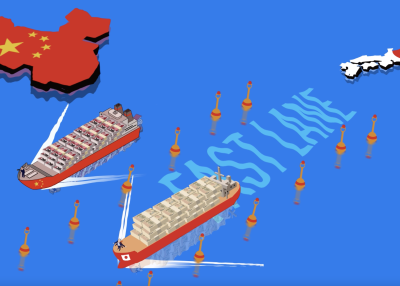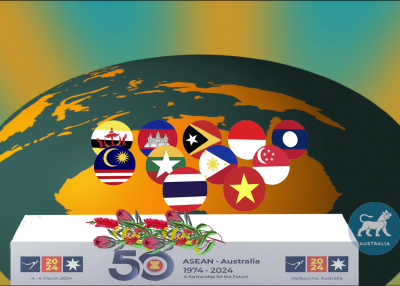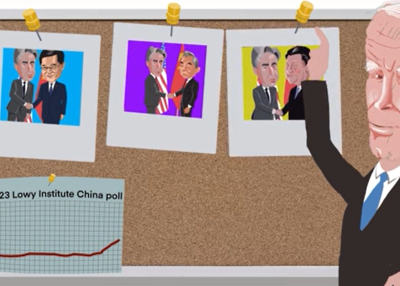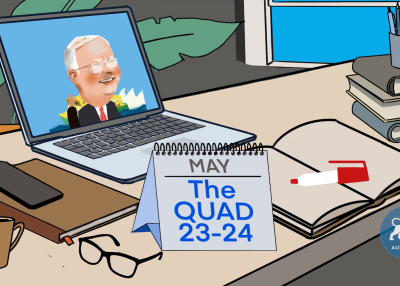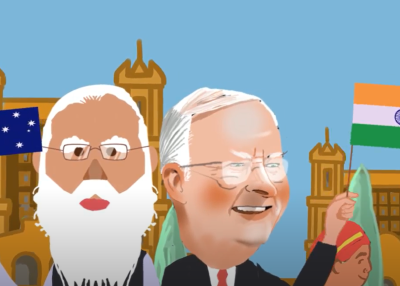Briefing MONTHLY #20 | September 2019
A new Jakarta | Educating Asia | Safe cities ranked
Jokowi's legacy. Animation: Rocco Fazzari. View it here.
CANBERRA, NAYPYIDAW, JOKOJAYA?
Indonesian President Joko Widodo may have set the tone for his final term in office with his hasty decision to announce a new national capital even before he is sworn back into power on October 20. But the big question is whether the move to carve a new capital out of the East Kalimantan jungle will now be Widodo’s legacy from a decade in office or whether its complications will rob him of a real legacy in a more valuable field like education? Australian National University economist Paul Burke says the Budget for the move has been underestimated leaving Widodo to pursue a multi-decade project at the cost of other policies which would produce positive outcomes during his final term in office. About 30 countries have attempted to create new capitals in the past century – from Canberra to Naypyidaw (in Myanmar) - with quite mixed results. But the Indonesian initiative is arguably even more of a gamble on decentralisation because the country is still trying to bed down one of the world’s most extensive regional autonomy programs which began 20 years ago.
- Fadhil Hasan and Achmad Nur Hidayat argue in this Jakarta Post article that the money would be better spent on education, health and infrastructure in many parts of the country.
- Amid growing debate about the state of Indonesia’s democracy, this Slate article draws on a Harvard Kennedy School study to argue that isolated capitals contribute to lower levels of democratic accountability.
- But James Crabtree argues in this Nikkei Asian Review article that Widodo will eventually be seen as far-sighted because climate change will force other Asian countries to shift people out of their large coastal cities.
NEIGHBOURHOOD WATCH
HONG KONG LEADS SLOWDOWN
The intractable protests in Hong Kong have put the city at the frontline of a broader growth slowdown across the Asian region driven by the US-China trade tensions. The Asian Development Bank’s latest outlook predicts that Hong Kong’s annual growth will slump to 0.3 per cent this year from 2.5 per cent last year as the impact of the protests adds to the wider regional economic weakness. The overall Asian growth outlook for this year has been cut to 5.4 per cent from the previous 5.7 per cent in April. The ADB says: “The trade conflict may yet intensify, possibly moving beyond tariffs. Evidence already shows it reshaping trade patterns, supply chains, and foreign investment.”
INFRASTRUCTURE WARS
Asian Development Bank president Takehiko Nakao provided an interesting insight during his recent visit to Australia into how his long-established institution is managing the arrival of Chinese-backed newcomers on the regional development landscape. With unusual frankness for a multilateral executive, Nakao praised the Asian Infrastructure Investment Bank (AIIB) for embracing cooperative lending practices while the declared the much larger Belt and Road Initiative (BRI) was worrying because it was generating too much lending. Delivering his only public comments in a lecture at the Australian National University, Nakao also criticised China for insisting on being treated as a developing country when it was already the equal of the US in many respects. It’s interesting that Prime Minister Scott Morrison has taken up this theme just a week later on his US visit.
FESTIVAL OF DEMOCRACY
Defining Indonesia’s democracy has become the issue of the moment as the country transitions from a hard fought election to five more years under a president who has disappointed many of his earliest supporters. The student protests against changes to the Criminal Code and the anti-corruption commission have dramatically underlined this. But it was also the subject of intense debate at this year’s Australian National University Indonesia Update with a sometimes grudging acceptance that Indonesia’s democracy still compares well with peers such as Turkey or Thailand despite serial setbacks for the rights of various minorities. ANU political scientist Ed Aspinall says the country has entered a new post-Soeharto phase with a functional participative democracy but a more purposeful erosion of liberal democratic rights and freedoms. But the University of Michigan’s Dan Slater says it remains a surprise that democracy has succeeded for 20 years. And he put this down to a combination of an egalitarian nationalist culture developed during Indonesia first democratic phase in the 1950s and the enduring institutions from its more recent authoritarian phase. As a result, President Joko Widodo has been able to tap into the deep reservoir of egalitarian nationalism while overseeing a series illiberal actions against opponents.
- This Sita Dewi article from The Jakarta Post draws on themes from the conference.
TWO DOWN, FOUR TO GO
To paraphrase Oscar Wilde, to lose one country is unfortunate and two at least a bit careless. But Taiwan is now looking down the barrel of losing almost all its remaining official regional diplomatic support. With the Solomon Islands and Kiribati shifting their diplomatic recognition to China in one week, much now depends on Tuvalu where a prime ministerial change has opened the way to another switch to China. That would make Taiwan dependent on Australian and US arm twisting in Nauru, the Marshall Islands and Palau for any remaining regional recognition despite the broader efforts – including Australia’s Pacific Step-up – to restrain rising Chinese influence in the Pacific. Meanwhile the Lowy Institute’s newly updated Pacific Aid Map shows China spending US$172 million a year compared with US$30 million for Taiwan, but China’s commitment is US$4.78 billion compared with US$38 million for Taiwan.
Back in Melbourne... the Asia Society Australia Centre launched on October 3 with a hawker stall themed ball at the NGV.
ASIAN NATION
BUSINESS RISK 101
Education’s role as Australia’s latest export growth star was cemented in August just time for the simultaneous debate about business risk, quality of education for overseas students and foreign influence on campuses. New figures showed education exports hit a record of $37.7 billion in 2018-19 with double-digit growth for the fourth successive year. Education export revenue grew 15.5 per cent last year and doubled in the past five years. The latest growth is being driven by expanding student numbers from India, which has replaced China as the main growth market but is far from catching up to China as an overall source of students. The university push to diversify away from high dependence on Chinese students was most symbolically underlined by Melbourne University vice chancellor Duncan Maskell announcing new engagement strategies in India and Indonesia in the same overseas trip.
- This report by Sydney University academic Salvatore Barbones for the Centre for Independent Studies reignited a simmering debate by arguing some universities were not being transparent about the risk they were taking with foreign student dependence.
- This response by University of Queensland chancellor Peter Varghese urging a calm approach to Chinese education exposure risks is interesting given his previous role as a senior foreign policy official.
- And this response by University of NSW vice chancellor Ian Jacobs is interesting because he concedes the rising quality of Chinese universities is crimping demand for offshore Australian education.
NEW ASIAN BUSINESS REVIEW
Australia’s peak business group has turned to the head of one of the country’s largest food service companies to lead a new review of strategies for regional business success. The Business Council of Australia (BCA) and Asia Society Australia are combining to create an Asia Taskforce to examine how companies and other organisations can increase their presence in the region. It will be chaired by Mark van Dyck, the Australia and Asia Pacific managing director of Compass Group, which provides food services to companies and other institutions. “The job of the taskforce will be to look at practical ways for Australian companies to build sustainable and successful businesses in Asia,” van Dyck says. The review will meet for the first time in early November to plan a one-year examination of how Australia can expand its economic engagement with Asian economies; diversify its economic partners; and prepare for a more strategically and economically competitive region. The group will be jointly overseen by BCA chief executive Jennifer Westacott, Asia Society Australia chief executive Philipp Ivanov and PwC partner Andrew Parker. Australia has seen several examinations of these issues in the past decade from the Gillard Labor government’s Asian Century White Paper in 2013 to the Passing Us By study published by PwC in 2014. But van Dyck says that while good work had been done in the past on Asian engagement, the new taskforce would focus on identifying successful business models and the necessary leadership skills. Westacott said she hoped the taskforce would help chart a course for Australian business in a new era when regional strategic and economic imperatives were changing.
- Read the joint Business Council of Australia and Asia Society Australia media release.
- See Untapped Potential below.
BAMBOO CEILING RULES
Eighty-two per cent of Asian-Australians say they have experienced discrimination in Australia which is the highest level of discrimination of all the ethnic groups surveyed. The survey by the Australian National University’s Center for Social Research and Methods found that 65 per cent of Asian-Australian respondents said they had been discriminated against in the workplace and 71 per cent said they had the experience in a restaurant or shop. The overall 82 per cent figure compares with 71 per cent for Aboriginal Australians and 67 per cent for African-Australians. The survey was released to coincide with the Asian-Australian Leadership Summit in Melbourne, where a list of 40 Asian-Australian leaders under 40 was announced.
WA ASIA POLICY
The Western Australian government has created a $1.2 million fund – Access Asia - to help small and medium enterprises get better access to Asia as part of its first Asian engagement strategy. The fund will provide assistance for market research and participation in trade events. The Asian engagement strategy was an election campaign promise by the McGowan government and will focus on: better research on trade and investment opportunities in Asian countries; improved Asian language skills, cultural understanding and connections; better people to people links; and better support for access to business and trade networks. The strategy establishes a 2030 timeframe for achieving increased trade and investment, a diversified economy through the development of the State's priority industry sectors and the development of an Asian-capable workforce.
GOING STEADY
Australia’s newest bilateral trade deal with Indonesia is still locked up in both countries’ legislatures waiting for ratification. But when it finally emerges new research has shown the world’s newest bilateral trade agreement will have the unique status of being between the two country’s with the most stable growth rates in the world. The research – to be published in the December edition of the Bulletin of Indonesian Economic Studies – argues that Indonesia has a more diverse economy than is often acknowledged and this has contributed to its ability to maintain stable growth when many peer countries are more volatile. The Indonesia-Australia Comprehensive Economic Partnership is built on new complementarities between the two economies and the Indonesian government’s annual latest Indonesia-Australia Business Summit in Sydney provided an insight into what it sees as priorities. The summit focused on car manufacturing, vocational education and training and infrastructure in tourism and special economic development zones.
DEALS AND DOLLARS
NO BABY STEP
The $1.5 billion takeover bid for infant formula manufacturer Bellamy’s Organic by China Mengniu Dairy Company has exposed a new tension in bilateral economic relations. Bellamy’s has been trying to secure registration to be able to sell its baby formula in Chinese retailers since new rules were introduced on January 1. Its lack of progress has weighed down its share price. Now the bid by Mengnui – partly owned by the government owned China National Cereals, Oils and Foodstuffs Corporation – has raised questions about whether Bellamy’s weakened share price set it up for a bid by an opportunistic Chinese investor. Update might be needed here since this is new although this item will probably still be right
BORAL ASIAN EXPANSION
Construction company Boral is creating a new Asian plasterboard joint venture with Germany’s Knauf as part of broader restructuring which will also see it resume full control of its Australian plasterboard business. In Asia Boral is paying $US241m in a series of transactions to wind up with a half share in a US$900 million joint venture with Knauf which will cover China, India, South Korea and South East Asia. Boral has been operating in South East Asia for 30 years and previously operated in a joint venture with US based USG, and the new business will retain access to USG technology.
ANZ CONTINUES ASIA SELL-OFF
ANZ Banking Group has exited businesses in Cambodia and Papua New Guinea as it continues one of the higher profile restructuring exercises by an Australian company in Asia. The bank has sold its 55 per cent stake in Cambodia’s ANZ Royal Bank to Japan’s J Trust, which has operations in five countries including banking in South Korea and Indonesia. ANZ has also sold its retail, commercial and small-medium enterprise banking businesses in Papua New Guinea to locally based Kina Bank. The sale continues the ANZ strategy of exiting so-called “super-regional” joint ventures in favour of operating wholly-owned institutional businesses in the region. It follows a Westpac exit from much of its Pacific business in 2015 and comes at a time when the Federal government is trying to encourage more Australian business activity in the Pacific.
Meanwhile on an executive team visit to Vietnam, ANZ chief executive Shayne Elliott said he still saw opportunities in Asia despite winding back the super-regional strategy and played down the impact of the US-China trade war on the bank’s regional business. “Having diversification into fast-growing places like Vietnam or China must be a good thing. What we haven't always done a good job of in the past is, can it be profitable growth? Growth is easy but can you do it profitability and sustainably?" he said in The Australian Financial Review.
CHINESE DOWNTURN COMING
Ansell chief executive Magnus Nicolin has warned China of “brutal" consequences as manufacturers leave the country over rising costs and fears about the US trade war. “So many manufacturers are moving out of China at breakneck speed. It's going to be quite brutal for China here, in a short while,” he told The Sydney Morning Herald. Nicolin said while Ansell had moved some production out of China due to trade concerns, it mostly would have happened due to rising costs. “We can produce a product at 20-30 per cent lower cost in Vietnam or Sri Lanka."
UNTAPPED POTENTIAL: TWO SURVEYS
Eighty per cent of Australian businesses say that Asia is on their radar but about the same proportion of businesses say they generate less than half their revenue from Asian markets. And 55 per cent of 130 businesses surveyed in the Asialink Business Commonwealth Bank of Australia capability survey say they generate less than five per cent of revenue from Asia. However, the survey found that when Asian markets were regarded as an important focus for a business, it on average earned 61 per cent of revenue from the region. That was 2.5 times the Asian revenue earned by businesses with only a minor focus on the region. The survey found 44 per cent of Australian businesses had a presence or interest n China, while 32 per cent had a presence or interest in South East Asia.
Meanwhile the latest Opportunity Asia report from the ANZ Banking Group found that 344 businesses out of 1000 surveyed were already active in Asia and 229 were considering regional business. Sixty four per cent of the businesses already active in Asia expected to expand their operations in the next three years. More than half indicated that they generated a higher profit margin from their Asian operations and on average 32 per cent of their overall revenue was generated from Asia. This level has grown steadily from 25 per cent in 2016. In contrast to the Asialink survey, 70 per cent of the Asia active businesses were in South East Asia and 69 per cent were in Greater China.
ON A ROLL
Melbourne lightweight wheel manufacturer Carbon Revolution has entered a partnership deal with Japanese trading house Mitsui & Co to assist its expansion into Asia. Mitsui has already helped the company market its light wheels to Japanese car companies but will now help it with sourcing raw material, recycling carbon fibre, logistics, trade and equipment finance and industrial automation.
FIRB FOCUS ON DATA
Foreign Investment Review Board chairman David Irvine has revealed that data security has become a key focus of foreign investment review decisions after a growth in investment applications which seek access to private data or data centres. Speaking at the Australia China Business Council, Irvine said: “FIRB is increasingly being required to look at more closely is the protection of sensitive Australian data – and not just sensitive national security data.” Irvine, a former security agency official and diplomat, emphasised that FIRB was not singling out Chinese applications for special attention noting that applications had been rejected from Japan, the United Kingdom, the US and China in recent years.
For more in-depth Australia-China analysis read the essays from Asia Society Australia’s 2019 China Edition of Disruptive Asia.
DIPLOMATICALLY SPEAKING
“China’s economic growth is welcomed by Australia and we recognise the economic maturity that it has now realised as a newly developed economy. This was the point of the world’s economic engagement with China. Having achieved this status, it is important that …. there is transparency in their partnerships and support for developing nations, all of this needs to reflect this new status and the responsibilities that go with it as a very major world power.” - Prime Minister Scott Morrison speaking in Chicago
“Australia must continue supporting a rules-based international order founded on values that enhance stability and prosperity for all people ... It might seem easier not to speak or act, but it is in our long-term interest to remember our core values. Our values are good for business because they underpin the rules and norms that support predictability and consistency, and thereby create the long-term conditions for prosperity.” Foreign Minister Marise Payne speaking in Canberra
"A strategic competition frame that manifests as ‘you’re either with us or against us’ limits the scope of regional players to make decisions that contribute to the region we want. And it reinforces – even if not intentionally – the notion of a binary choice: that the only alternatives are accepting a Chinese-led regional order or unconditional support for US-defined strategic competition with Beijing.” Labor shadow foreign minister Penny Wong speaking in Jakarta
DATAWATCH
ASIA’S SAFEST CITIES
WHAT WE’RE READING
A SAVAGE DREAMLAND: JOURNEYS IN BURMA by DAVID EIMER (Bloomsbury)
David Eimer arrived in Myanmar for the first time in 2010, as he puts it, “in search of the road less travelled.” But by the time he got back in 2015 to actually write this book about those roads the country – which he insists on calling Burma - had changed a great deal. “The half-empty roads I had driven down from the airport in 2010 were a distant memory. Now they heaved with new cars, trucks and a fleet of buses with the name of the city of Busan written on their sides, part of an aid package from South Korea,” he writes of an isolated country at least superficially transformed by the arrival of democracy. “In 2010, when my Blackberry went dead on arrival in Yangon, only North Korea had fewer mobile phones than Burma. Five years on and you could buy a Chinese made handset for ₤20.” Nevertheless, Eimer has still found plenty of backroads to travel in search of the old Burma which still largely exists despite the changes in the way the country is run and the new flow of foreign aid and investment. This is really a travel book but where the main aim is the destination rather than the journey which doesn’t have a clear trail. Things are moving so fast in Burma that Eimer can add little to the debate about the fall from grace of democracy leader Aung San Suu, the mistreatment of the Rohingya refugees or the uncertainty about what is going to happen at next year’s elections. But his travels to remote corners do leave the impression that the country has a long way to go in resolving old separatist tensions, ethnic disputes and the insidious power of the once all powerful military before really joining the mainstream of South East Asia. Much of his focus is on recounting how it was plundered or brutalised in the colonial era in ways that are still playing out today.
ON THE HORIZON
THAILAND EYES RCEP VICTORY
Thailand is touting the Association of South East Asian Nations (ASEAN) summit in Bangkok in November as the potential time to announce an end to the long running negotiations on a Regional Comprehensive Economic Partnership (RCEP) trade deal. And in a sign some difficult decisions have been made, Malaysia’s Trade Minister Darell Leiking has claimed that controversial foreign investor dispute settlement provisions won’t be included in the agreement. Thai Deputy Prime Minister and Commerce Minister Jurin Laksanawisit said after a trade minister meeting in early September that ministers had agreed the talks should be wrapped up soon and the result of the negotiations announced at the ASEAN Summit. The agreement would then be signed in 2020. Negotiations have been underway since 2012 but the latest statement from the September meeting did not reveal any further detailed progress on the previously announced conclusion of seven out of 20 planned chapters. This article from East Asia Forum provides a good analysis of whether India will be allowed to delay a conclusion to the RCEP negotiations by November.
ABOUT BRIEFING MONTHLY
Briefing MONTHLY is a public update with news and original analysis on Asia and Australia-Asia relations. As Australia debates its future in Asia, and the Australian media footprint in Asia continues to shrink, it is an opportune time to offer Australians at the forefront of Australia’s engagement with Asia a professionally edited, succinct and authoritative curation of the most relevant content on Asia and Australia-Asia relations. Focused on business, geopolitics, education and culture, Briefing MONTHLY is distinctly Australian and internationalist, highlighting trends, deals, visits, stories and events in our region that matter.
Partner with us to help Briefing MONTHLY grow. For more information please contact [email protected]
Read previous issues and subscribe >>


